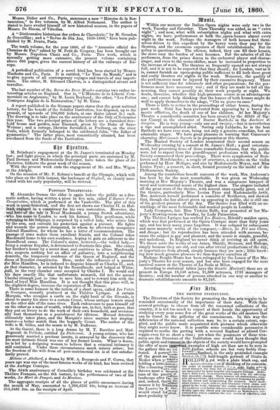PARISIAN THEATRICALS.
M. Alexandre Dumas the elder is again before the public as, a dra- matic author, having written a piece in five 'acts, called L' Ewen 'd' tote Conspiration, which is performed at the Vaudeville. The plot of this work is quasi-historical, and the first act shows our Charles II. in Hol- land, engaged in a conspiracy for his own restoration. However, the real here of the tale is Evan Macdonald, a young Scotch adventurer, ..who has come to London to seek -his fortune. This gentleman, while returning to hisitffigings, is surprised by a veiled lady, who seizes him by the arm, and entreats his protection against a pursuer. He fights and wounds the person designated, in whom he afterwards recognizes Colonel Hamilton, for whom he has a letter of recommendation. The passage of arms makes them excellent friends, and the Colonel takes Macdonald home to his own residence, hoping to gain an adherent to the Roundhead cause. The Colonel's sister, however,—the veiled lady,— being a zealous Royalist, is determined to frustrate this plan. She enters her brother's house by a secret door, and contrives to allure Macdonald, who suspects nothing but an affair of gallantry, into a neighbouring domicile, the temporary residence of the Queen of England, and the :focus of Royalist conspiracies. Here, under the influence of a passion for Miss Hamilton, he is induced to disguise himself as Charles II., and, tin that character, is arrested by the Roundheads, and lodged at White-
in the very chamber once occupied by Charles I. He would end • his days exactly like that unfortunate monarch, did not the second Charles triumph just in time to save him, and to reward him with the hand of loyal Miss Hamilton. It is not thought that this piece will- in the slightest degree, increase the reputation of M. Dumas.
There is some humour in the notion of a short opera,. called Lea Valets de Gascogne, recently produced at the Theatre Lyrique. A certain Marquis, who occupies a castle on the right bank of the Gironde, is about to marry his niece to a certain Count, whose antique towers stand on the other side of the same river. Each endeavours to pass himself off on the other as a man of wealth, while they are, in fact, both so poor, that they put on livery to do the work of their own household, and occasion- ally beat themselves as a punishment for idleness. Mutual detection ultimately takes place, and the Marquis's niece marries her singing- master—a better match than the beggarly Count. The author of this trifle is M. Gilles, and the music is by M. Dufresne.
At the Gaiete, there is a long drama by M. T. Barriere and Mad. Regnault de Prebois, entitled La nchcresse. A young artisan, who has generously married a penitent lorette, is annoyed by the discovery that his most intimate friend was one of her former lovers. What is worse, he is led by a designing woman to believe that a criminal intimacy is still continued. Under these circumstances much misery arises; but the freedom of the wife from all post-matrimonial sin is at last satisfac- torily proved.
Heloise et .4bellard, a drama by MM. A. Bourgeois and F. Coma, that years ago was one of the most famous works of its kind, has been revived at the Ambigu Comique.
The 254th anniversary of Corneille's birthday was celebrated at the Theatre Francais, on the 6th instant, by the performance of two of his works, La Mort de Pompe'e, and Le Matgen% The aggregate receipts of all the places of public amusement during the month of May, amounted to 1,206,523f. 40c, being an increase of 315,548f. 34c. on the receipts of April.


























 Previous page
Previous page